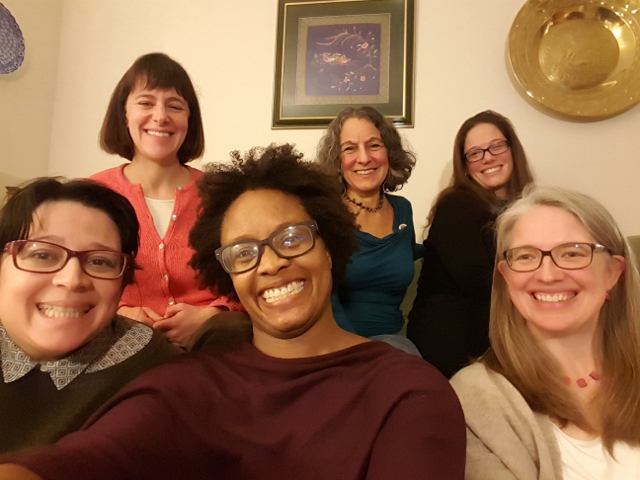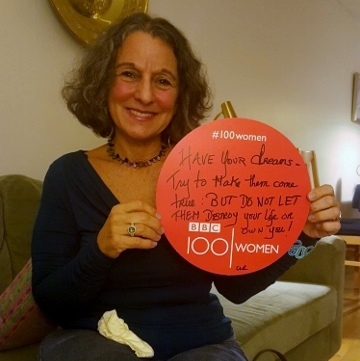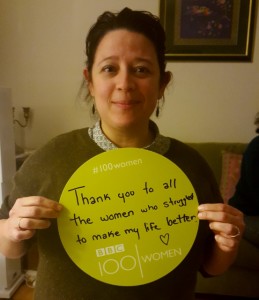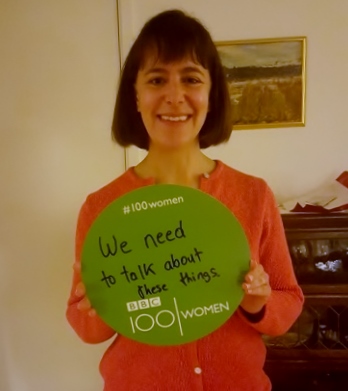BBC #100Women: Talking about self image, careers and gender roles in Oslo
Does a woman’s successful career affect her relationship? What are some self-image issues for women who are over 35? How do we raise our boys to be men who respect women’s boundaries?
Interesting questions, right? Well, I joined a group of American women in Oslo to discuss these and much more as part of the BBC’s 100 Women Season, which is an annual series focused on sharing more women’s stories.
About 100 groups of women from around the world gathered Tuesday in cafes, homes and conference rooms to talk about issues that we face and share that on social media. The conversation was to be divided into three subject matters, image, relationships and leadership. Our small, but vocal group hailed from all over the U.S., but are now in Oslo. Our experiences here varied. One woman had lived in Norway for 44 years, and then there was me, who has been here for about six months, everyone else fell in between. Some of us had kids, others didn’t, some had jobs, while a few were highly educated but under employed.
We started our conversation with image. Living in Scandinavia, the land of tall blondes with blue eyes and slim figures, can be challenging for women who don’t fit that mold of beauty. It’s easy to feel like you’re surrounded by a bunch of Barbie dolls. For generations Norway’s been a very homogeneous society. I remember Hubby telling me that one girl in his elementary school class was considered “exotic” because she was the only blond with brown eyes.
Today Norway, like the rest of the world, is rapidly changing. There’s a lot more brown: Brown hair, brown skin and brown eyes. And there’s certainly more curves. A few of us curvier, shorter, browner types at the meeting said that we had to work more on accepting ourselves as we are. We can’t all be Barbie, and most of us frankly don’t want to be. But it’s still tricky when you’re surrounded by what we’ve been taught is the standard of beauty.
A few more interesting tidbits the group discussed included:
- One early 40-something with a head full of thick, beautiful gray hair said she loved turning 40 because it made her “invisible.” People began treating her differently because they saw her as “old.” For her it was very freeing and she finally stopped worrying about how she looked. “Though it sucks that I’m invisible, it’s great not to have to worry about all that stuff anymore.”
-
For those of us with junk in our trunk, shopping for jeans is a challenge in any country. Here it’s even moreso, and one woman who loves shopping at thrift stores decided she needed to lose weight in order to find pants that fit. As for me, I’m just trying to get enough courage to approach the rare curvy Norwegian: where do you get your jeans?
- As we get older, it becomes more apparent that we wear nice clothes, cute shoes and have killer handbags to get other women’s approval. We’re not trying to catch a man’s attention, we’re trying to make a favorable impression. I’d like to say that I think we all need to agree that yoga pants are and forever will be couture and if we wear them for work, church, or date night, we shall be praised profusely. Sound good?
The image and clothes discussion segued into the old-school and horrifically wrong idea that because a woman dresses a certain way, means she’s “asking for” a sexual assault. One woman noted how when we talk about how a woman can avoid being raped, we remove the responsibility of men and of society to fix this problem. That led to my provocative question: How can I ensure that my boys don’t grow up to be rapists?
Naturally I don’t think that they will and we have been having conversations about our bodies and boundaries since they were about two years old. Still, I know there’s plenty of moms whose sons have been charged with rape or are incarcerated for sexual assault and they too would never think their son capable of such an atrocity. One woman said she thought it was about teaching respect, which I agreed but believe there’s more to it. In our home we focus on respecting and implementing boundaries around our bodies and I also am a big proponent of yes means yes, often called “affirmative consent.”
Our discussion on women in leadership roles was different from the other BBC #100Women groups, I think in large part because in Scandinavia the gender gap is slimmer than most parts of the world. There are many factors that go into this, quality education for all, paid maternity and paternity leave, and the general idea that we’re all on the same team.
That’s not to say it’s all roses over here, but some of the obstacles that trip up women as they climb to the top aren’t as prevalent in Norway. We generally agreed that if a woman was in a healthy relationship, it didn’t seem that would be harmed by her success because there’s not as much pressure for men to be the main breadwinner like it is in the states.
The big takeaway for us was that we need to talk more about these issues. There’s something very empowering about talking with women who are fighting similar battles as well as overcoming different obstacles. You feel less alone and more inspired to do better and be better.
So thank you BBC for this enlightening opportunity.






I hope you don’t mind, but I Twittered your blog post on the AWCO twitter account. 🙂
Of course that’s fine! Thank you for doing so!
Such an inspiration and what a wonderful network of women!
You are blessed!